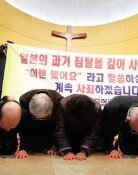New ambassadors are tasked with multilateral diplomatic efforts
New ambassadors are tasked with multilateral diplomatic efforts
Posted June. 08, 2022 07:53,
Updated June. 08, 2022 07:53
President Yoon Suk-yeol has completed filling ambassadorial posts for the United States, Japan, China, Russia, and the United Nations. On Tuesday, President Yoon appointed four ambassadors—Yoon Duk-min, former head of the Korea National Diplomatic Academy, as ambassador to Japan; Chung Jae-ho, professor of international relations at Seoul National University, as ambassador to China; Chang Ho-jin, former presidential secretary for foreign affairs under the Lee Myung-bak administration; and Hwang Joon-kook, former ambassador to Britain, as ambassador to the United Nations. Earlier, Cho Tae-yong, former People Power Party lawmaker, was named ambassador to the United States.
By appointing five major ambassadorial posts with career diplomats and scholars, the Yoon Suk-yeol administration has differentiated itself from the former Moon administration that named non-diplomatic politicians to ambassadorial posts. Unlike the envoys under the former administration, many of whom merely held onto posts mostly without much presence and were criticized for inappropriate choice of words, the newly appointed envoys are expected to display their competency and experience in diplomatic affairs. Their professional expertise are especially in need during times of change, like right now, when the country is surrounded by external variables, including U.S.-China conflict and global supply chain disruption.
Although the Yoon administration’s appointment is open to criticism that it gave posts on the basis of presidential campaign contributions and based on personal connections, the appointees are the known “U.S. specialists,” many of whom served under the Lee Myung-bak and Park Geun-hye administrations but were expelled under the Moon Jae-in administration.
Many cabinet positions in the Yoon Suk-yeol administration have been filled with these U.S. pundits, from the Office of National Security, Foreign Ministry, Defense Ministry, to the National Intelligence Service, which became even more noticeable by the latest ambassadorial appointments. The appointee to ambassador to China, Chung Jae-ho, is also a scholar who studied the Chinese history and U.S.-China relations in the United States and has continuously criticized the government’s passive and reticent diplomacy.
The Yoon administration has proclaimed to become a “global pivotal country” based on fundamental values such as democracy and human rights, with its utmost priority on the South Korea-U.S. alliance. In the midst of a deepening confrontational divide between the West and China-Russia and North Korea’s continuous nuclear and missile provocations, South Korea’s change in diplomatic stance is natural and inevitable; yet, the Yoon administration must ensure that it does not excessively lean towards the U.S., as such inclination may backfire, straining the relations with the other side.
Since the inauguration of President Yoon, the South Korea-U.S. relations have become noticeably strengthened, along with significant efforts made to restore the South Korea-Japan relations. On the contrary, South Korea’s relationship with China and Russia practically remains unchanged. On the battlefields of the new cold war that will only become fiercer, South Korea must employ practical and multilateral diplomatic strategies to advance the national interests in its relationship with China and Russia. Particularly, ambassadors stand at the forefront of the national diplomatic efforts to persuade and mediate both sides at times of conflict. There should be no ambassador who act as bystanders or who are ignored as though they were invisible men.







